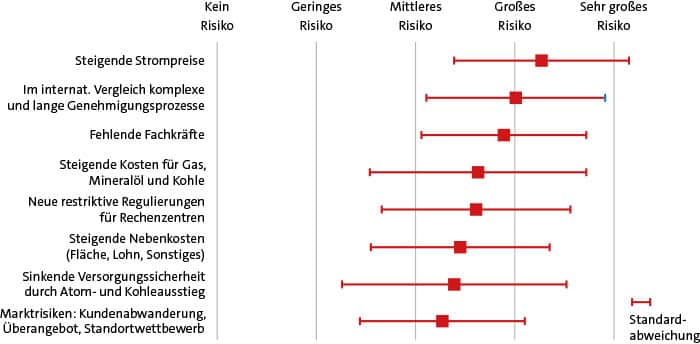

High electricity prices burden data centers and digital economy
Despite the early abolition of the EEG surcharge, electricity costs in Germany, including taxes, levies, network charges and surcharges, are still among the highest in Europe. Electricity costs account for the lion's share of operating costs, especially in so-called colocation data centers. The use of colocation data centers is widespread; they provide IT infrastructure and servers for companies' IT applications and generally pass on the electricity costs directly and usually in full to these companies. In the cloud data center sector, prices are also expected to rise in the medium term. "Data centers and telecommunications networks are the backbone of digitization in Germany. The high electricity prices are not only a burden on the industry itself, they also have an impact on all companies that depend on them," says Bitkom Chief Executive Bernhard Rohleder.

"In addition to a rapid expansion of renewable energies, we need location conditions that keep data centers in the country. The demand for data center capacity and locations continues to grow significantly." There are currently around 3,000 data centers in Germany with more than 40 kW of IT connection capacity and at least ten server racks. In addition, there are around 47,000 smaller IT installations. The electricity demand of data centers in Germany is currently 16 billion kilowatt hours per year - by 2030, the increase in demand is expected to be between 3.5 and 5 percent annually, according to the Bitkom study "Data Centers in Germany," which was conducted by the Borderstep Institute.
"It is also important that data center operators continue to increase their energy efficiency - also in the interest of climate protection. Great progress has been made here in recent years. For example, the computing capacity installed in data centers per kilowatt hour of electricity consumed has increased almost fivefold since 2010," Rohleder emphasizes. If the functionality of communication networks and data centers were to be interrupted, this would have serious consequences for the economy, society and the state, Bitkom warns. A comprehensive crisis strategy must therefore give priority and full consideration to the requirements of this infrastructure and secure the energy supply for system-relevant uses, he adds.





